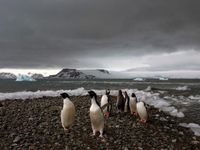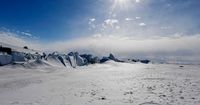CAPE TOWN, South Africa — A member of a South African research team that is confined for more than a year at an isolated Antarctica base was put under psychological evaluation there after he allegedly assaulted and sexually harassed colleagues, government officials said. The problems at the SANAE IV base were first reported by South Africa’s Sunday Times newspaper, which said it had seen an email from a team member to authorities last month claiming the man had attacked the base leader and made threats. The email pleaded for help. “His behavior has escalated to a point that is deeply disturbing,” the email said, according to The Sunday Times. “I remain deeply concerned about my own safety, constantly wondering if I might become the next victim.” The report said the man allegedly made a death threat.
South Africa’s Ministry of Environment, which oversees the research missions, said in a statement Monday night that the alleged assault on the base leader was reported on February 27, and officials and counselors intervened remotely “to mediate and restore relationships at the base.” They were speaking with team members almost daily, it said. “The alleged perpetrator has willingly participated in further psychological evaluation, has shown remorse and is willingly cooperative,” the ministry said, adding that he had written a formal apology to the victim of the alleged assault. It said the allegations were being investigated. No one was identified.
The nine-member team, which includes scientists, a doctor, and engineers, is expected to stay at the base for about 13 months until next year, authorities said, living in close quarters through the hostile Antarctic winter, whose six months of darkness begin in June. The base is on a cliff in Queen Maud Land and is surrounded by a glacial ice sheet, more than 4,000 kilometers (2,485 miles) from South Africa. The next planned visit by a supply ship is in December, according to the South African National Antarctic Program.
It takes the ship around 10 days to travel from Cape Town. Authorities said they had decided not to evacuate anyone from SANAE IV, where the onset of unpredictable weather conditions meant the team was now confined to the base. The ministry said all team members had undergone evaluations ahead of the trip to ensure they are able to cope with the “extreme nature of the environment in Antarctica” and the isolation and confinement, and no problems were identified.
“It is not uncommon that once individuals arrive at the extremely remote areas where the scientific bases are located, an initial adjustment to the environment is required,” it said. Previous problems have been reported at another of South Africa’s remote research bases on Marion Island, a South African territory near Antarctica. In 2017, a member of a research team there smashed a colleague’s room with an ax over an apparent love triangle, according to a report to South Africa’s Parliament.
Lawmakers said it appeared the researchers were living in highly stressful conditions. The National Science Foundation, the federal agency that oversees the U.S. Antarctic Program, published a report in 2022 in which 59% of women in the U.S. program said they’d experienced harassment or assault while on research trips in Antarctica.
The SANAE IV base, established in 1960, is vital to South African researchers collecting scientific weather data for climate monitoring, atmospheric studies, and geological surveys. The team deployed on February 1 and is now expected to endure the Antarctic winter, which begins this June. With little contact with the outside world during the long, dark winter months, the importance of maintaining team morale will be essential as they continue their critical research in this isolated environment.
South African researchers have faced similar challenges in the past, prompting authorities to remain vigilant about the mental well-being of their teams. Studies indicate that working in such extreme isolation can have serious effects on mental health, which probably contributes to the rising number of psychological evaluations being conducted by researchers stationed in Antarctica.
An alleged violent incident at the Russian-operated Bellingshausen research station in 2018 involved a stabbing that led to the perpetrator being taken back to Russia after an emotional breakdown. The victim was evacuated but later dropped charges against the assailant, showing the complicated emotional dynamics present even among research teams under extreme conditions.
Fortunately, the structures in place at SANAE IV aim to promote stability and safety amongst the crew members in what can sometimes seem like a hostile environment. The intervention by psychological counselors and officials from South Africa’s Ministry of Environment reflects a commitment to ensure the health and safety of everyone stationed at the base. They continue to monitor the situation closely.
As the SANAE IV base crew faces an unpredictable winter ahead, it remains to be seen how the interplay of group dynamics and the stresses of isolation will affect their ongoing research and personal relationships. Authorities are hopeful that they can maintain a balanced environment, ensuring that safety and progress go hand-in-hand.





